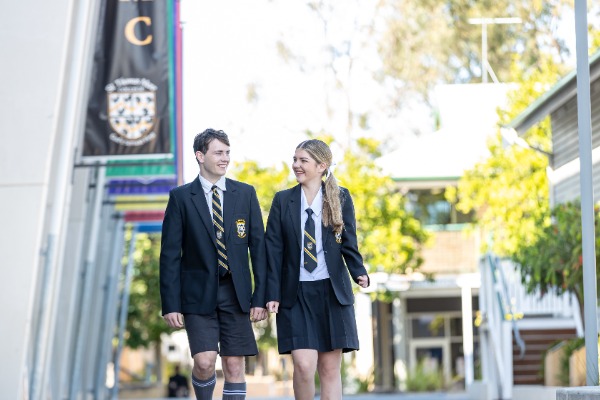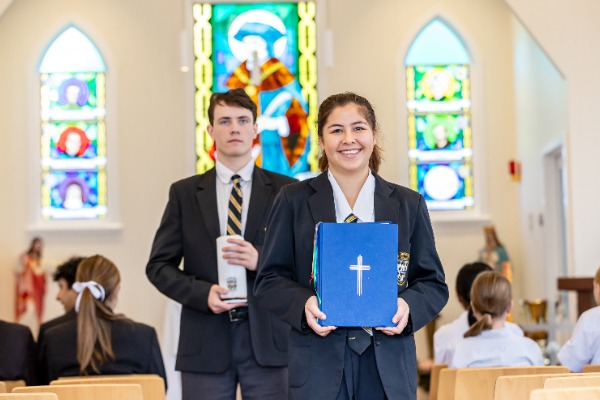The College's Religious Education program is a cornerstone of its identity as a Catholic school, with religion taught across all year levels. In Years 7-10, students follow the Religion syllabus outlined by Brisbane Catholic Education. For Years 11 and 12, students can choose between Queensland Curriculum and Assessment Authority (QCAA) governed subjects: Religion & Ethics and Study of Religion. The curriculum is diverse, covering Catholicism and other faiths such as Islam, Judaism, Hinduism, and Buddhism.
The school encourages critical thinking and hermeneutical skills by examining religious texts from various faiths in dialogue with the Bible and Church documents. Generally, the College follows a reverse hermeneutic approach to religious education, where for instance, a contemporary social justice issue might be explored first, followed by reflection and their linking to scripture.
Students at STMC are taught to approach scripture critically using the 'Three Worlds of the Text' framework, which guides them in textual interpretation. The framework aims to lead students towards symbolic understandings of the text, Post-Critical Belief, and a Dialogical understanding of faith.
College Retreat Program
The College's Retreat Programs offer students opportunities to reflect on themselves, their relationships, and the world around them, fostering spiritual and emotional growth at every stage of their journey.
The Year 8 Reflection Day, led by Michael Fitzpatrick, introduces students to the concept of sacramentality, encouraging them to recognise the sacred in all aspects of life—within themselves, others, community, and nature. This day helps students begin to see the world through a spiritual lens, realizing that the divine is present in every moment and encounter. It invites them to explore the deeper significance of their actions and relationships.
For Year 9 students, The Rite Journey is implemented as a structured rite of passage program, designed to support their transition from childhood to young adulthood. The program focuses on personal development, promoting healthy relationships, identity, authenticity, and the importance of being true to oneself. Through guided activities and reflections, students are challenged to examine their values, character, and relationships, allowing them to step into adolescence with confidence and self-awareness.
In Year 10, students participate in a two-night, three-day experience at Luther Heights, Coolum, as part of Project Hatch. This experience is designed to help students overcome fears, recognize their personal strengths, and reflect on the significant people in their lives. Through team-building activities and personal reflection, students discuss themes like the different "masks" they wear in daily life and the fears that hold them back. A key component of this experience is affirmation writing, where students reflect on their positive qualities and those of their peers, reinforcing a sense of belonging and self-worth.
The Year 12 Kairos Retreat, with its theme "Called to Be More," invites students to reflect on their own potential and the sacredness of their existence. This retreat emphasises the importance of flourishing by following one's dreams and embracing the inherent dignity of life. A central message is that to understand the sacredness of one's own life, it is equally important to recognize the sacredness in others. The retreat helps students explore who they truly are, deepening their self-awareness and their understanding of their place in the world.
Each of these experiences is carefully designed to promote personal growth, spiritual development, and a deeper sense of connection to others, shaping students into thoughtful, self-aware, and compassionate individuals.


© BCE/St Thomas More College/2025.